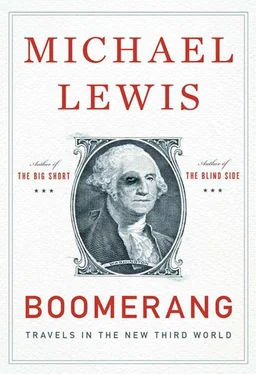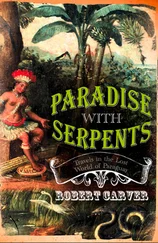Back in 2008, unable to come to terms with its many creditors, Vallejo had declared bankruptcy. Eighty percent of the city’s budget—and the lion’s share of the claims that had thrown it into bankruptcy—were wrapped up in the pay and benefits of public safety workers. Relations between the police and the firefighters, on the one hand, and the citizens, on the other, were at historic lows. The public safety workers thought that the city was out to screw them on their contracts; the citizenry thought that the public safety workers were using fear as a tool to extort money from them. The local joke was that “P.D.” stands for “Pay or Die.” The city council meetings had become exercises in outrage: at one, a citizen arrived and tossed a severed pig’s head onto the floor. “There’s no good reason why Vallejo is as fucked up as it is, says a longtime resident named Marc Garman, who created a website to catalogue the civil war. “It’s a boat ride to San Francisco. You throw a stone and you hit Napa.” Since the bankruptcy, the police and fire departments had been cut in half; some number of the citizens who came to Phil Batchelor’s office did so to say they no longer felt safe in their own homes. All other city services had been reduced effectively to zero. “Do you know that some cities actually pave their streets?” says Batchelor. “That’s not here.”
I notice on his shelf a copy of Fortune magazine, with Meredith Whitney on the cover. And as he talked about the bankrupting of Vallejo I realized that I had heard this story before, or a private-sector version of it. The people who had power in the society, and were charged with saving it from itself, had instead bled the society to death. The problem with police officers and firefighters isn’t a public-sector problem; it isn’t a problem with government; it’s a problem with the entire society. It’s what happened on Wall Street in the run-up to the subprime crisis. It’s a problem of people taking what they can, just because they can, without regard to the larger social consequences. It’s not just a coincidence that the debts of cities and states spun out of control at the same time as the debts of individual Americans. Alone in a dark room with a pile of money, Americans knew exactly what they wanted to do, from the top of the society to the bottom. They’d been conditioned to grab as much as they could, without thinking about the long-term consequences. Afterward, the people on Wall Street would privately bemoan the low morals of the American people who walked away from their subprime loans, and the American people would express outrage at the Wall Street people who paid themselves a fortune to design the bad loans.
Having failed to persuade its public safety workers that it could not afford to make them rich, the city of Vallejo, California, had hit bottom: it could fall no lower. “My approach has been I don’t care who is to blame,” Batchelor said. “We needed to change.” When I met him, a few months after he had taken the job, he was still trying to resolve a narrow financial dispute: the city had 1,013 claimants with half a billion dollars in claims but only $6 million to dole out to them. They were survivors of a shipwreck on a life raft with limited provisions. His job, as he saw it, was to persuade them that the only chance of survival was to work together. He didn’t view the city’s main problem as financial: the financial problems were the symptom. The disease was the culture. Just a few weeks earlier, he had sent a memo to the remaining city staff—the city council, the mayor, the public safety workers. The central message was that if you want to fix this place you need to change how you behave, each and every one of you. “It’s got to be about the people,” he said. “Teach them respect for each other, integrity and how to strive for excellence. Cultures change. But people need to want to change. People convinced against their will are of the same opinion still.”
“How do you change the culture of an entire city?” I asked him.
“First of all we look internally,” he said.
THE ROAD OUT of Vallejo passes directly through the office of Dr. Peter Whybrow, a British neuroscientist at UCLA with a theory about American life. He thinks the dysfunction in America’s society is a by-product of America’s success. In academic papers and a popular book, American Mania , Whybrow argues, in effect, that human beings are neurologically ill-designed to be modern Americans. The human brain evolved over hundreds of thousands of years in an environment defined by scarcity. It was not designed, at least originally, for an environment of extreme abundance. “Human beings are wandering around with brains that are fabulously limited,” he says cheerfully. “We’ve got the core of the average lizard.” Wrapped around this reptilian core, he explains, is a mammalian layer (associated with maternal concern and social interaction), and around that is wrapped a third layer, which enables feats of memory and the capacity for abstract thought. “The only problem,” he says, “is our passions are still driven by the lizard core. We are set up to acquire as much as we can of things we perceive as scarce, particularly sex, safety, and food.” Even a person on a diet who sensibly avoids coming face-to-face with a piece of chocolate cake will find it hard to control himself if the chocolate cake somehow finds him. Every pastry chef in America understands this, and now neuroscience does, too. “When faced with abundance, the brain’s ancient reward pathways are difficult to suppress,” says Whybrow. “In that moment the value of eating the chocolate cake exceeds the value of the diet. We cannot think down the road when we are faced with the chocolate cake.”
The richest society the world has ever seen has grown rich by devising better and better ways to give people what they want. The effect on the brain of lots of instant gratification is something like the effect on the right hand of cutting off the left: the more the lizard core is used the more dominant it becomes. “What we’re doing is minimizing the use of the part of the brain that lizards don’t have,” says Whybrow. “We’ve created physiological dysfunction. We have lost the ability to self-regulate, at all levels of the society. The five million dollars you get paid at Goldman Sachs if you do whatever they ask you to do—that is the chocolate cake upgraded.”
The succession of financial bubbles, and the amassing of personal and public debt, Whybrow views as simply an expression of the lizard-brained way of life. A color-coded map of American personal indebtedness could be laid on top of the Centers for Disease Control’s color-coded map that illustrates the fantastic rise in rates of obesity across the United States since 1985 without disturbing the general pattern. The boom in trading activity in individual stock portfolios; the spread of legalized gambling; the rise of drug and alcohol addiction; it is all of a piece. Everywhere you turn you see Americans sacrifice their long-term interests for a short-term reward.
What happens when a society loses its ability to self-regulate, and insists on sacrificing its long-term self-interest for short-term rewards? How does the story end? “We could regulate ourselves if we chose to think about it,” Whybrow says. “But it does not appear that is what we are going to do.” Apart from that remote possibility, Whybrow imagines two possible outcomes. The first he illustrates with a true story, which might be called the parable of the pheasant. Last spring, on sabbatical at the University of Oxford, he was surprised to discover that he was able to rent an apartment inside Blenheim Palace, the Churchill family home. The previous winter at Blenheim had been harsh, and the pheasant hunters had been efficient; as a result, just a single pheasant had survived in the palace gardens. This bird had gained total control of a newly seeded field. Its intake of food, normally regulated by its environment, was now entirely unregulated: it could eat all it wanted, and it did. The pheasant grew so large that when other birds challenged it for seed, it would simply frighten them away. The fat pheasant became a tourist attraction and even acquired a name: Henry. “Henry was the biggest pheasant anyone had ever seen,” says Whybrow. “Even after he got fat, he just ate and ate.” It didn’t take long before Henry was obese. He could still eat as much as he wanted, but he could no longer fly. Then one day he was gone: a fox ate him.
Читать дальше












